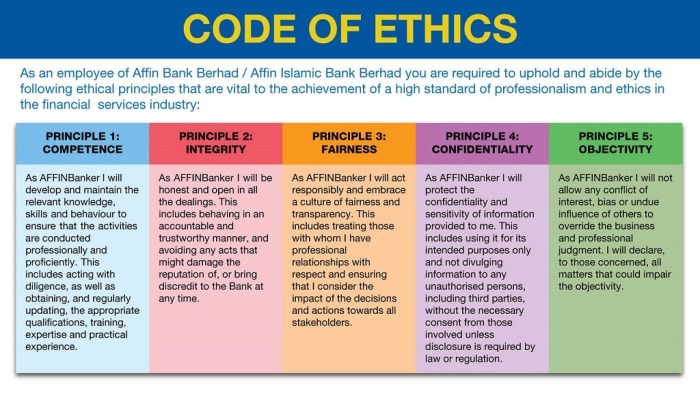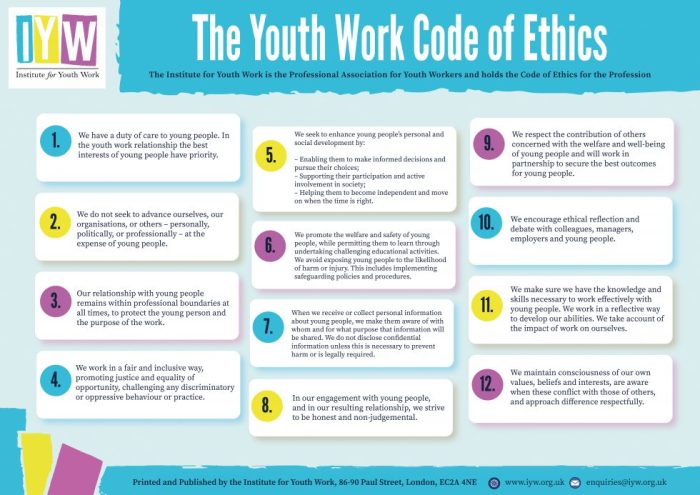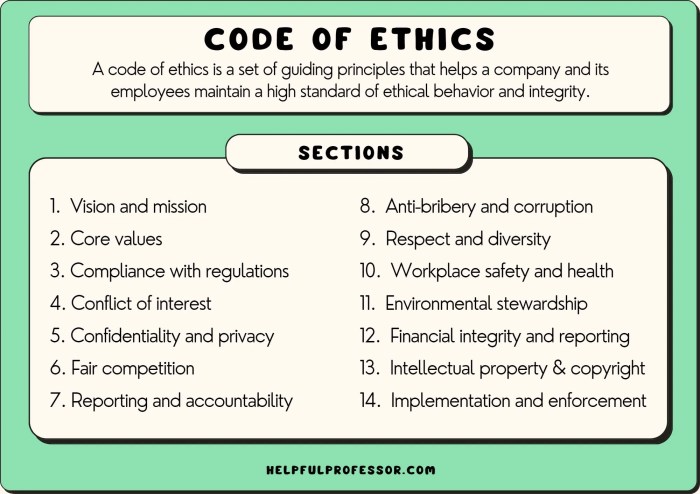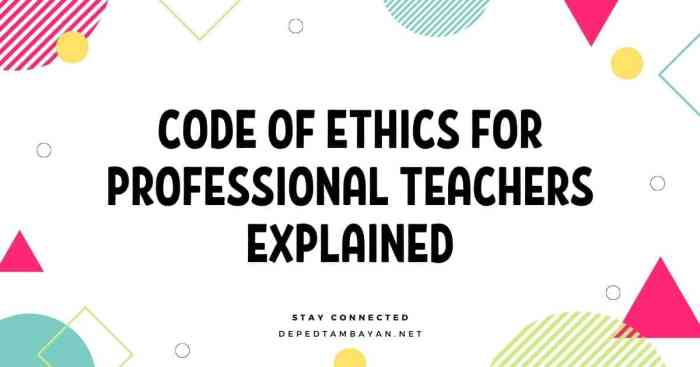Code of Ethics Article 10 establishes a framework for ethical decision-making in professional settings. This comprehensive guide Artikels the fundamental principles that guide professional conduct, ensuring the protection of individual rights and societal responsibilities.
Article 10 encompasses a wide range of professional practices, providing clear guidelines for ethical behavior in diverse contexts. By adhering to these principles, professionals can maintain the integrity of their profession and foster public trust.
Ethical Considerations in Article 10

Article 10 of the Code of Ethics for Professional Accountants (IESBA) provides guidance on ethical considerations related to non-assurance services (NAS).
Key Ethical Principles
Article 10 enshrines several key ethical principles, including:
- Objectivity and Independence:Accountants must maintain objectivity and independence in providing NAS, avoiding conflicts of interest that could impair their judgment.
- Professional Competence and Due Care:Accountants must possess the necessary competence and exercise due care when providing NAS, ensuring the quality and reliability of their services.
- Confidentiality:Accountants must respect the confidentiality of information obtained during the course of providing NAS, protecting client privacy and sensitive data.
- Professional Behavior:Accountants must act in a professional and ethical manner, upholding the reputation of the profession and maintaining public trust.
Scope and Application of Article 10

Article 10 of the code of ethics provides guidance to professionals in the specific areas of their practice that involve the use of information and communication technology (ICT). The code applies to professionals who are members of the professional organization that has adopted the code and who are engaged in activities related to ICT.
Types of Professionals Bound by the Code
The code of ethics applies to professionals in various fields, including but not limited to:
- Computer scientists
- Software engineers
- Information technology professionals
- Data analysts
li>Network administrators
Application in Different Professional Contexts, Code of ethics article 10
The code of ethics applies to different professional contexts, including:
- Research and development
- Design and implementation
- Operation and maintenance
- Education and training
- Consulting and advisory services
Professional Responsibilities under Article 10

Article 10 of the Code of Ethics for Professional Accountants establishes specific responsibilities for professionals to ensure the integrity and objectivity of their work. These responsibilities include maintaining independence, exercising professional judgment, and avoiding conflicts of interest.
Ethical Implications
The ethical implications of these responsibilities are significant. Maintaining independence is crucial for ensuring that professionals are not influenced by personal or financial biases that could compromise their objectivity. Exercising professional judgment requires professionals to apply their knowledge and experience to make sound decisions that are in the best interests of their clients and the public.
Avoiding conflicts of interest helps professionals maintain their integrity and reputation.
Fulfilling Responsibilities
Professionals can fulfill their responsibilities under Article 10 by:
- Maintaining a professional attitude and adhering to ethical principles.
- Exercising due care and diligence in their work.
- Disclosing any potential conflicts of interest to their clients or employers.
- Refusing to engage in any activity that could impair their independence or objectivity.
- Continuing their professional development to stay abreast of new developments and best practices.
Enforcement and Consequences

The enforcement of Article 10’s code of ethics is crucial to maintain the integrity and credibility of the profession. There are several mechanisms in place to ensure compliance and address violations.
One key mechanism is through professional organizations and licensing boards. These bodies have the authority to investigate complaints, conduct hearings, and impose disciplinary actions against members who violate ethical standards.
Code of Ethics Article 10 emphasizes the importance of maintaining a high level of integrity and professionalism. To further your knowledge in this area, you can refer to the comprehensive EPA 608 study guide pdf . This guide provides valuable insights and resources to enhance your understanding of ethical conduct.
By incorporating these principles into your practice, you can ensure that you adhere to the highest standards of professionalism and ethical behavior as outlined in Code of Ethics Article 10.
Potential Consequences
Violations of Article 10 can result in a range of consequences, depending on the severity of the breach. These consequences may include:
- Formal reprimands or warnings
- Suspension or revocation of licenses or certifications
- Fines or other financial penalties
- Exclusion from professional organizations or conferences
- Damage to reputation and loss of public trust
Enforcement Actions
Enforcement actions have been taken against professionals who have violated Article 10’s code of ethics. For example, in one case, a licensed therapist was found to have engaged in sexual misconduct with a client. As a result, the therapist’s license was revoked, and they were barred from practicing in the profession.
Case Studies and Ethical Dilemmas: Code Of Ethics Article 10

Ethical dilemmas are situations where professionals face conflicting values and obligations, making it difficult to determine the right course of action. Article 10 provides guidance on how to navigate these challenges, emphasizing the importance of integrity, objectivity, and professional competence.
Real-world case studies can illustrate how ethical principles can be applied to resolve ethical dilemmas. These case studies highlight the complex choices professionals may encounter and the ethical implications of different decision-making approaches.
Case Study: Conflict of Interest
An engineer is asked to design a new bridge by a construction company. However, the engineer’s spouse is a major shareholder in a competing construction company. This creates a potential conflict of interest, as the engineer’s personal financial interests could influence their decision-making.
According to Article 10, professionals must avoid conflicts of interest or disclose any potential conflicts to ensure objectivity and fairness. In this case, the engineer should disclose the conflict of interest to the construction company and take steps to mitigate any potential bias.
Case Study: Whistleblower Dilemma
A healthcare professional discovers that their hospital is violating patient privacy regulations. The professional faces an ethical dilemma: they can either report the violations, potentially putting their job at risk, or remain silent and potentially compromising patient safety.
Article 10 emphasizes the importance of protecting the public interest and reporting illegal or unethical activities. In this case, the healthcare professional has a duty to report the violations, even if it may have negative consequences for them personally.
FAQ
What are the key ethical principles enshrined in Article 10?
Article 10 upholds principles such as integrity, objectivity, professional competence and due care, confidentiality, and professional behavior.
How does Article 10 apply to different professional contexts?
The code applies to a wide range of professional settings, including accounting, finance, healthcare, law, and engineering, among others.
What are the potential consequences of violating Article 10?
Violations of the code may result in disciplinary actions, such as suspension or revocation of professional licenses, or legal consequences.
